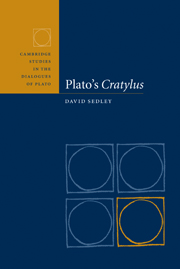Chapter 7 - A Platonic outcome
Published online by Cambridge University Press: 22 September 2009
Summary
THE PRINCIPLES OF ETYMOLOGY
We have seen Socrates nearing his final verdict on the nature–convention debate. His demonstration that names must rely on some degree of convention in order to succeed in signifying things was not, it turned out, any kind of vindication of Hermogenes' common-sense conventionalist thesis. It was simply one element in his refutation of Cratylus' thesis that names map onto reality with a perfect precision which makes their study the ideal guide to truth. It is that refutation of Cratylus, and the matching advocacy of a different route to truth, that will occupy us as we reach the dialogue's climax. But, on the way to that finale, one of my tasks will be to gather together the series of other Platonic lessons that the dialogue has brought to light.
First let me try to characterise Socrates' final position on the correctness of names. When Socrates argued that convention must play a part, he included the following words: ‘I myself too like the idea that so far as possible names do resemble their objects’ (435c2–3). The expressions ‘I … like the idea’ (literally ‘it pleases (areskei) me that …’) and ‘so far as possible’ have sometimes led to the impression that Socrates is either presenting little more than a pipedream (wouldn't it be nice if names really were vocal portraits?), or else more formally setting out the norms for an ideal language. There is actually no good reason to think so.
- Type
- Chapter
- Information
- Plato's Cratylus , pp. 147 - 173Publisher: Cambridge University PressPrint publication year: 2003

